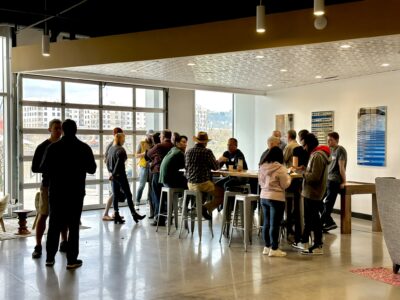In yet another sign of Pittsburgh’s robotics prowess, one of the city’s top firms just secured a multi-million-dollar government contract to expand its expertise in the field.
Lawrenceville-based RE2 Robotics this week announced a new $9.5 million contract from the Office of Naval Research in the U.S. Navy to develop robotic systems to neutralize underwater mines. This contract follows a previous one with the Navy in May 2020 for $2.5 million, and another from 2018 for the same amount, both to address similar underwater defense problems.
RE2 Robotics specializes in developing mobile robotic manipulation systems for the defense, aviation, energy, material handling and medical industries.
“There’s a common thread across all of those,” the company’s president and CEO, Jorgen Pedersen, told Technical.ly. “They all need intelligent mobile manipulation to perform challenging tasks.”
As far as defense applications go, Pedersen said RE2 has been working with the Navy since 2006, and this new funding will build on past progress.
“We started moving from these rudimentary arms that had limited dexterity and control into these incredible arms that were more human-like — they could do more what humans could do.”
RE2 took the robots underwater with the 2018 contract. The advanced physical capabilities of the robots are now backed up with supervised autonomy — meaning a human is there for support or machine errors — that makes threat neutralization much easier and safer. Using the RE2 Sapien Sea Class device, which combines the robotics and autonomy skills with the company’s advanced computer vision platform, RE2 will put the funding of this most recent $9.5 million contract toward figuring out how to get the robots to attach neutralization devices to underwater mines and other explosives. Beyond addressing threats in deeper water, Pedersen said, another aim of the contract is to manage those in shallow waters or at ports, as well.
Despite the several government contracts that RE2 has earned since its founding in 2001, Pedersen said over half of the company’s business is now in commercial deals.

Jorgen Pedersen. (Photo via LinkedIn)
“That ratio is going to keep favoring commercial as we continue to grow, not because defense isn’t also growing,” he said. “But because commercial is just growing that much faster.”
Pittsburgh has long had enough robotics expertise to be considered a global capital of the industry, and Pedersen thinks newfound commercial interest in robotic technologies post-pandemic will drive business here even more. Social distancing measures and health concerns around face-to-face interactions encouraged more people to consider how robotics could play a new role in their lives that they hadn’t anticipated.
“And because of that, I think we’re at this inflection point where we’re going to see the industry pulling robotics into new applications that we’ve never seen before,” Pedersen said. As for how that’s helped accelerate new business deals for RE2: “We’re at a point where we’re taking calls, not making calls,” the CEO said.
The business is growing beyond new deals, too. Before the pandemic, RE2 had around 50 employees. But in the last 18 months, that number has almost doubled to over 90 people, with multiple openings posted on the company’s website.
Pittsburgh is unique in that there's there's such a feeling of community and helping each other, even across companies.
Many of RE2’s commercial deals aren’t public information yet, but Pedersen shared that he foresees a broader wave of robotic integration two or three years down the road from now. In one example the CEO could discuss, RE2 leveraged a government deal to use robotics manipulation systems for solar field construction as energy concerns rise.
With deals like this and others still under wraps, Pittsburgh’s economy stands to benefit.
A Carnegie Mellon University graduate, Pedersen founded the company a few years after earning his master’s degree in robotics. While the university is what initially brought him to the city, he stayed for the robotics expertise and growing community. The past 20 years, and the recent successes of autonomous vehicle industry leaders here, have made him confident in the decision to stay.
“I’ve traveled all over the world, I’ve been to many cities to other robotics clusters,” he said. “And I can say that Pittsburgh is unique in that there’s there’s such a feeling of community and helping each other, even across companies that I haven’t seen anywhere else.”
The level of support here for innovation in the robotics sector helps multi-million dollar contracts like this most recent one for RE2 reach more members of the community. Not only is there a healthy exchange of ideas across groups like the Pittsburgh Robotics Network, Pedersen said, but there is also a culture of working together in business deals that support local manufacturers, startups and other robotics-adjacent companies.
“It’s a network, and the money flows beyond RE2’s walls into the community,” he said, “so that it continues to bond us and maintain what Pittsburgh is.”
Sophie Burkholder is a 2021-2022 corps member for Report for America, an initiative of The Groundtruth Project that pairs young journalists with local newsrooms. This position is supported by the Heinz Endowments.Join the conversation!
Find news, events, jobs and people who share your interests on Technical.ly's open community Slack




